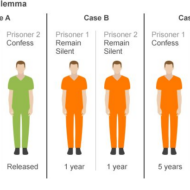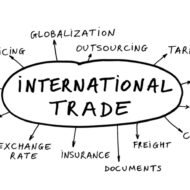Posted by Managementguru in Business Management, Marketing, Operations Management, Principles of Management, Strategy
on Mar 16th, 2014 | 0 comments

Game theory and strategy What is Game Theory: Set of concepts designed for decision making in situations of competition and conflict under specified rules. The prisoner’s dilemma: The prisoner’s dilemma is a canonical example of a game, analyzed in game theory that explains why two individuals might not cooperate, even if it appears that it is in their best interest to do so; Albert W. Tucker formalized the game with prison sentence payoffs and gave it the “prisoner’s dilemma” name. To solve many practical problems that are encountered in economic, military or other disciplines, one has to deal with situations in which there are two or more conflicting parties striving for the same objective and the outcome of each action of one party depends solely on the opposite parties choice of a course of action. As we all know only one horse can win the race ultimately and the other parties only can prolong the race or see to that they make every possible move to delay the opponent’s success. So, what’s this game theory all about? This is a special mathematical method that was evolved mainly to analyze conflict situations where the number of competitors is finite, each participant has a definite set of actions to choose and there is a conflict of interest between the competitors. So it helped the participants to reach a decision that would put them in the winning post. This theory has spilled its implications on business situations where success is the motto and conflict and competition the order of the day. Only the best among the best survive. Darwin’s theory, “Survival of the fittest” applies not only to biological organisms but also to business organizations which are also abuzz with activity. Chance Moves: Games like chess, checkers are played according to a definite set of rules laid down and these game patterns has inspired business persons to introduce strategies in business, where the concentration is mainly focused on the chance moves that defeats the opponent. Big business corporates mainly concentrate on the strengths and weaknesses of their competitors to have an edge over them. A real game is controlled and regulated by the statutory rules to be followed but a business game involves lot of killer instincts and intuitions combined with rational thinking and logic. Optimal Strategy: The first party always puts himself in the shoes of the other party and tries to perceive how the other party would react in a particular situation. Although the aim is to win, choosing the optimal strategy is what matters. It will at least keep you in bay. Precise solutions can be arrived at if you plan your game fittingly. The anticipation and thrill that is involved in a strategic game is matchless. We witness a lot of firms imitating what the leader of the market does. The risk is borne solely by the firm introducing the change and the firm takes the major share of profit as it is the pioneer and if it loses the next strategic move is planned for. For a company with sound financial position, the chance move is worth giving a try, head or tail doesn’t matter. The stalkers are benefited by the waiting period during which they come to know of the pros and cons of the strategy employed by the leader. Games are played in the true spirit of sportsmanship, but a business faces cut throat competition. There is no space for any courtesy or liberal approach. If you are quick enough to pick the pulse of the people by gauging their preferences, analyzing the market conditions and employing timely strategies you will at...

Posted by Managementguru in Economics, Financial Management, International Business, Marketing, Project Management
on Mar 11th, 2014 | 0 comments

What is Trade? Trade is the exchange of commodity and services. International trade represents business transactions taking place at the global level, and it is fundamentally different from domestic trade. Trade at international level demands huge investments, network of franchisees and proficient people to run the show. Many corporate giants are trying to capture Asian markets, especially Indian market, which has become the industrial hub for such economic activities. Economic liberalization has been the focus of many developing countries for the past two decades and this has allowed multinational companies with huge investment potential to enrich the weaker economies. What is International Trade? International trade tries to generate more foreign exchange, which is always good for the economy. Say, if a country has rich resources of petroleum, naturally it will try to sell the surplus to countries not endowed with such natural resources. That is why Middle East nations are prosperous and economically independent. The diversity in productive possibilities in different countries is due to the presence of limited natural resources. When a country gets a head start in a particular product, it can become the high volume, low cost producer. The economies of scale give it a significant advantage over other countries, which find it cheaper to buy from the leading producers than to manufacture the product themselves. Barriers for Effective Trade Every nation must try to specialize in the production and export of those commodities, which are available in plenty and must import such products in the production of which they have a resource deficiency. It should be remembered that there are severe man made barriers in international trade such as, export duties, quotas, exchange restrictions etc.,that hinder the free movement of products. International Trade and Finance Nevertheless, it is not also possible for a country to produce domestically every kind of product. In spite of all these restraining factors, global trade is thriving, thanks to the advanced technological aspects introduced in communication and faster means of transportation. Distance is no more a constraint and the world has become one small global village. Foreign Exchange Issues All domestic transactions, say in a country like India take place in rupees, which is the legal tender in the country. However, in its trade with other countries like USA, Germany, Japan, France and Britain, the payments have to be made in terms of dollars, marks, yens, francs and pound sterling respectively. The mechanism through which payments are effected between two countries having different currency systems is called foreign exchange. It may be also defined as the exchange of money or credit in one country for money or credit in another. Foreign exchange rates can affect relative prices and net exports. A rise in the a nation’s foreign exchange will depress that nation’s net exports and output, while a fall in the foreign exchange rate will increase net exports and output. Because of the significant impact of exchange rates on national economies, countries have entered into agreements on international monetary...




